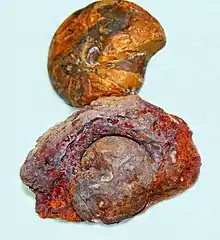| Beyrichoceras | |
|---|---|
 | |
| Fossil shells of Beyrichoceras from Visean of Madagascar (Erfoud) | |
| Scientific classification | |
| Domain: | Eukaryota |
| Kingdom: | Animalia |
| Phylum: | Mollusca |
| Class: | Cephalopoda |
| Subclass: | †Ammonoidea |
| Order: | †Goniatitida |
| Family: | †Maxigoniatitidae |
| Genus: | †Beyrichoceras Foord, 1903 |
Beyrichoceras is a genus belonging to the goniatitid family Maxigoniatitidae[1] that lived during the Mississippian Period (Early Carboniferous)
Description
Beyrichoceras can be recognized by its small, thickly discoidal shell with small umbilicus, deep dorsal impression, arched flanks and rounded venter [2] The ventral lobe of the suture is bifurcated, wide at its base, narrowing apically, ending in a pair of outwardly turned prongs separated by a low median saddle. The first lateral lobe is similar in size to the ventral lobe; broad, V-shaped, and more or less symmetrical. The umbilical lobe, like the first lateral lobe, is broad, V-shaped, and fairly symmetrical, only much shallower. The dorsal lobe is long and narrow, closely flanked by narrow internal lobes.
Taxonomic position
Beyrichoceras is assigned to the Maximitidae,[1][3] although some authors have assigned it to the Muensteroceratidae or Anthracoceratidae.[4] Miller and Furnish [2] included Beyrichoceras in the subfamily Goniatitinae, family Goniatitidae, and superfamily Goniatitaceae. The Maxigoniatitidae, established by Korn, Klug & Mapes, 1999, is based on Goniatites maximus var. saourensis Pareyn, 1961, renamed Maxigoniatites
Distribution and range
Beyrichoceras is found in middle Lower Carboniferous ( Mississippian upper Osagean-Meremacian equivalent) strata [4] in North America, Europe, and North Africa.[2][3]
Paleoecology
Beyrichoceras has been described as a "fast-moving nektonic carnivore".[1] Its small, involutely coiled form nevertheless suggest a floating nektonic or nekto-benthic stalker capable to sudden swift maneuvering. As with all known cephalopods, Beyrichoceras was undoubtedly carnivorous.
References
- 1 2 3 4 Paleobioloby-Beyrichoceras 12/08/09
- 1 2 3 Miller, Furnish, and Schindewolf, 1957, Paleozoic Ammonoidea, Treatise on Invertebrate Paleontology, Part L, Mollusca 4.
- 1 2 GONIAT-online 12/08/09
- 1 2 W. B. Saunders, D. M. Work, S. V. Nikolaeva Evolution of Complexity in Paleozoic Ammonoid Sutures, Supplementary Material Science magazine